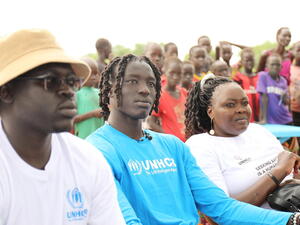Displaced in Pakistan, between a rock and a hard place
Displaced in Pakistan, between a rock and a hard place

Displaced children in Kacha Garhi camp in Peshawar, north-western Pakistan.
PESHAWAR, Pakistan, October 28 (UNHCR) - Mohammed* hasn't slept well in months. His 22-year-old face is lined and there is a permanent furrow between his brows. It's no wonder - he and his family have fled the conflict in Pakistan's tribal areas, only to find themselves huddling under a tent today.
He is among tens of thousands of Pakistanis displaced by the recent fighting between government forces and militants in the tribal areas bordering Afghanistan. More than 12,800 have been registered in four accessible camps for internally displaced people (IDPs) in Pakistan's North-West Frontier Province (NWFP). Registration is going on in other camps and among host families.
"Early this year, militants in our village started kidnapping people, extorting money and forcing civilians to join them," says Mohammed, explaining the situation in his home region in Bajaur, one of seven agencies in the Federally Administered Tribal Areas of north-western Pakistan. "We formed a committee to oppose them, but they killed everyone who joined. We're farmers - we never had arms, or we wouldn't have allowed them in."
When the military operation was launched in early August, many among the local population welcomed it. "I'm very happy the army is rooting out the militants," says Mohammed. "But the aerial bombing targeted our neighbour's house. Our house was hit too. We ran out and couldn't take anything with us. We lost our wheat and cattle worth 200,000 rupees (US$2,474)."
They walked for six hours through the mountains before reaching the road. They then bussed through Mohmand Agency to Charsadda district in NWFP, where they were hosted by strangers for a few days. When they heard there were camps in the provincial capital of Peshawar, they went immediately.
Kacha Garhi used to be an Afghan refugee village in the heart of Peshawar. It was closed in July last year, but has now been resurrected as an IDP camp for Pakistanis. Run by the Commissionerate for Afghan Refugees with the support of the UN refugee agency, the camp is now home to more than 1,000 families, or some 6,000 displaced people.
New arrivals are registered before receiving food rations and relief items such as UNHCR tents, plastic sheets, jerry cans and kitchen sets.
Mohammed says the living space in Kacha Garhi camp for his family grouping of 15 is crowded. To support them, he does daily wage labour in the camp, such as helping an aid agency to level the ground for newcomers.
"I'm thinking of going to Karachi with my brother to work," he says. "But I'm not comfortable leaving the woman and children in this condition. Maybe when we get one or two more tents and space out the family, we'll think about the next step."
Asked if he foresees returning to Bajaur any time soon, he says, "At home, the crops were standing but we couldn't harvest them. If there's some security, I may go back to harvest. But for now, the roads are closed."
The furrow in Mohammed's brows deepens. "We can't all go back because if the terrorists in our area catch us, they'll slaughter us. But we've heard that the situation in Bajaur won't be normal for the next eight months. We're worried about how to spend the time here, especially with winter coming."
Under the UN response to the IDP situation in Pakistan, UNHCR is the lead agency for camp management, protection and emergency shelter. The agency is working with the authorities and partners to coordinate and manage IDP camps in NWFP, including registration and the provision of shelter, health care, water and sanitation facilities.
It currently has access to four camps in Peshawar, Charsadda, Nowshera and Mardan districts, and is trying to support the authorities in less accessible camps in Dir district.
UNHCR is also part of a task force working on an assistance package to help the displaced people through the winter.
* Name changed for protection reasons
By Vivian Tan in Peshawar, Pakistan









